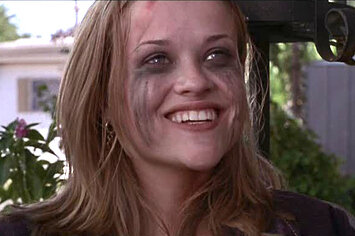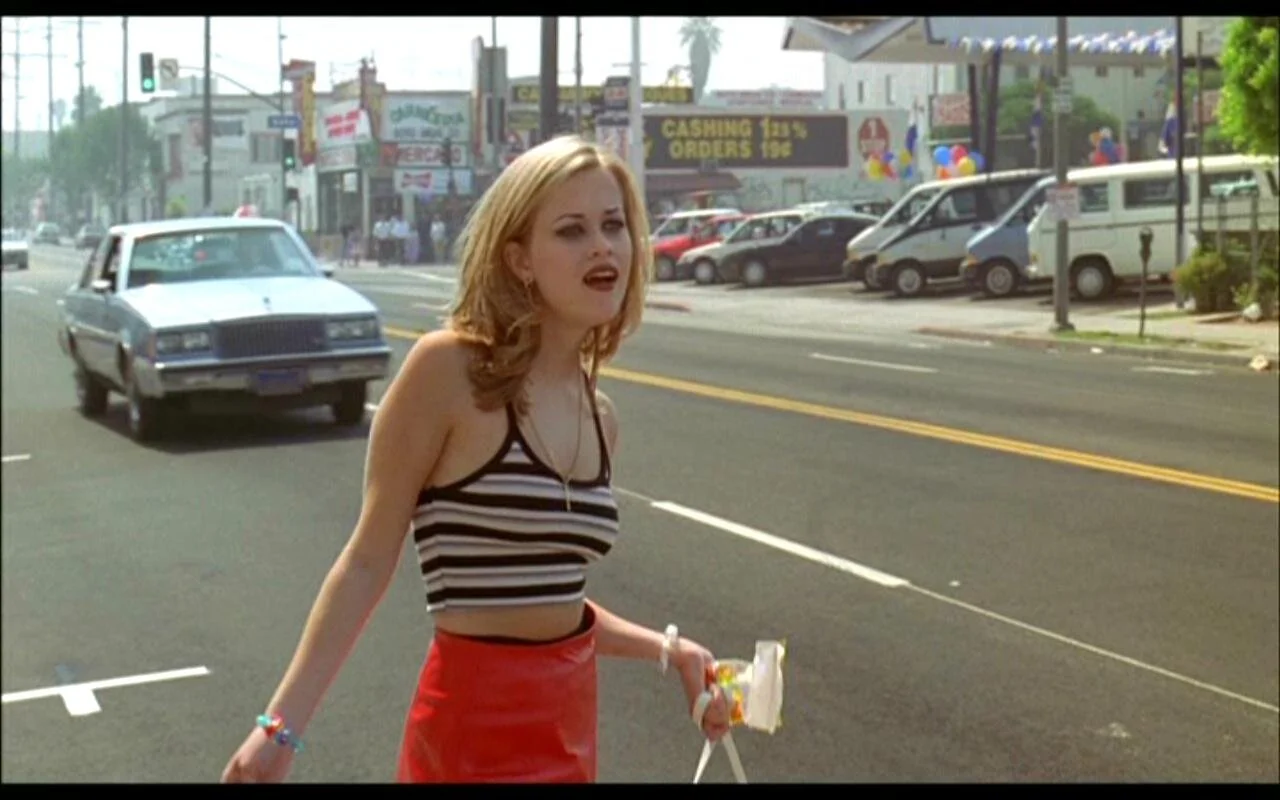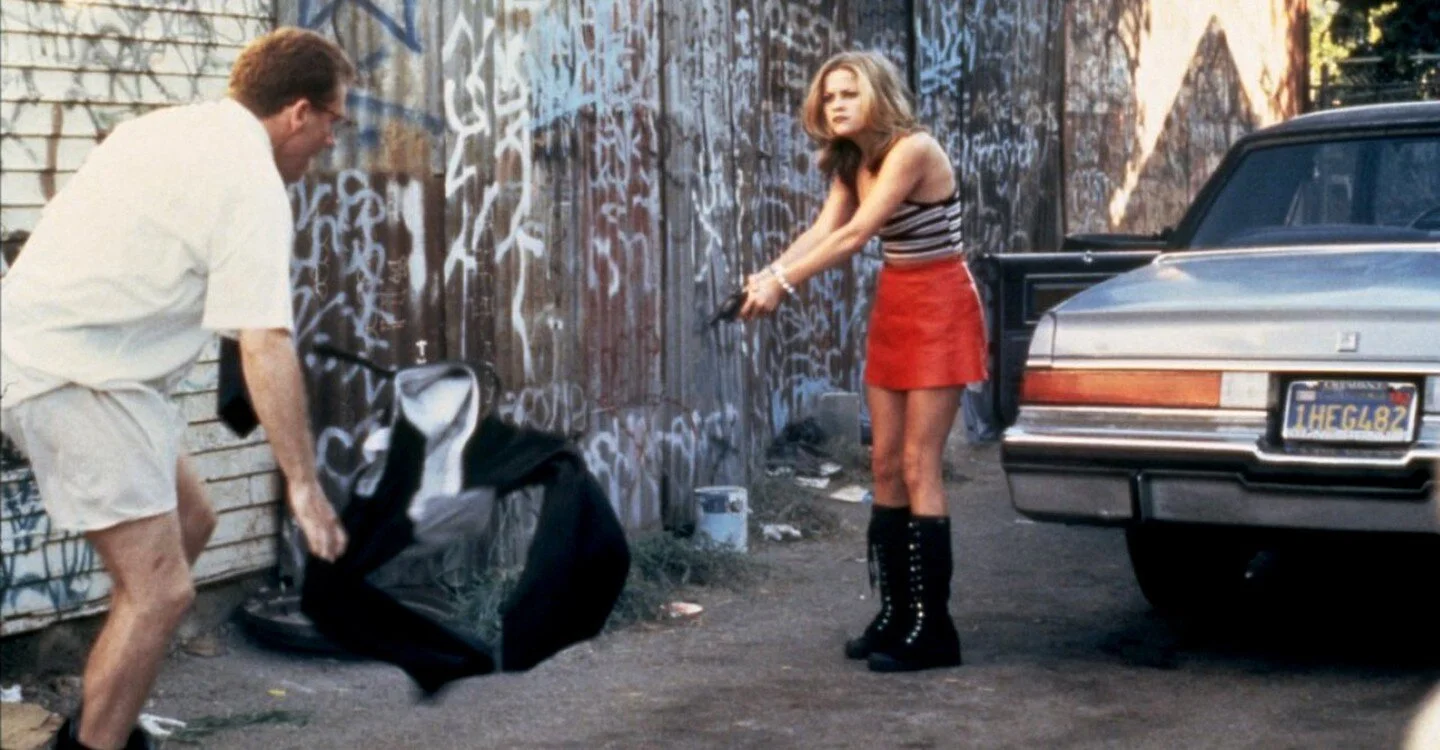Matthew Bright's 1996 Red Riding Hood Riff Freeway Is a Bonkers 1970s Drive-In Movie Delight
Welcome, friends, to the latest entry in Control Nathan Rabin 4.0. It’s the career and site-sustaining column that gives YOU, the kindly, Christ-like, unbelievably sexy Nathan Rabin’s Happy Place patron, an opportunity to choose a movie that I must watch, and then write about, in exchange for a one-time, one hundred dollar pledge to the site’s Patreon account. The price goes down to seventy-five dollars for all subsequent choices.
The importance of Control Nathan Rabin 4.0 was driven home this last month when I foolishly went almost four weeks without a new entry due to the Christmas break and focussing on finishing the Weird Accordion to Al book and Travolta/Cage project and my monthly Patreon haul nose-dived to something like eight hundred dollars below where it stood the year before.
So I am going to be writing a fuck-ton of these pieces in the days, weeks, months and years ahead because I sincerely enjoy writing the column, I want to satisfy everyone kind enough to make that generous of a contribution to the site and my career and I also want to continually remind readers that this column/option exists and has more or less single-handedly kept this website in business nearly three years in.
I also love Control Nathan Rabin 4.0 because it gives me an excuse to revisit movies from my adolescence and early years as a film critic that hit me right in the nostalgia sweet spot and prove just as wickedly wonderful the second time around.
That was certainly true of Matthew Bright’s 1996 cult classic Freeway. It’s at once very much a product of a very specific cinematic era, a very deliberate throwback to a series of gloriously trashy cinematic subgenres from the 1970s that flourished in drive-ins and an eerily prescient look at toxic masculinity and violent, murderous misogyny as a cultural plague.
When Bob Wolverton, the school therapist, necrophiliac, rapist and serial killer Kiefer Sutherland plays unforgettably as a monster with the blandly wholesome demeanor of Ned Flanders and Ted Bundy’s mind talks of his hatred of women as a whole and every woman he encounters individually he sounds like every bit like a Men’s Rights Activist.
It’s safe to assume that if Freeway were made today in a digital rather than analog era Bob Wolverton would live online and find a toxic community of men who feel the same way about women that he does, albeit not to the extent of going offline to murder them.
Among its many other unforgivable crimes, the internet has empowered horrible men who despise women to conceive of that hatred as an ideology and a moral philosophy rather than a violent pathology and debilitating moral sickness. They’ve come to believe that if they hate women with an all-consuming passion that must be because there is something fatally wrong with women, not with themselves.
Yes, the “women are evil” brigade would have turned old Bob into a martyr had he lived and died in our time rather than the 1990s, as a respected husband and pillar of the community assassinated by a feral female criminal in a fit of man-hating rage.
Freeway never stops punishing and humiliating Bob, whether in the form of heroine Vanessa (Reese Witherspoon, revelatory in a performance that would have won her her first Academy Award in a perfect world) shooting him a whole bunch of times and connecting more than once, facial disfigurement from gunshot blasts that give the ghoulish illusion of a perpetual smile and a whole lot of kiddie porn for the cops and his horrified wife to discover at home.
It never stops being fun as well as emotionally and creatively satisfying watching Vanessa, a borderline illiterate arsonist and sometimes teen prostitute, continually get the upper hand over the evil, violently sexist piece of shit.
Forbidden Zone screenwriter Matthew Bright conceived of Freeway as a 1970s drive-in movie spin on Little Red Riding Hood where Red is an arsonist and former child prostitute, Grandma lives in a trailer park and the wolf takes the form of an unassuming-looking middle age man who initially presents himself as a sympathetic, paternalistic figure before revealing a core of pure malice.
It’s a testament to both the ballsiness and the depth of Witherspoon’s brilliant, hilarious and utterly fearless performance that she manages to invest in Vanessa an unexpected tenderness, even innocence, despite being a shiv-making, pistol-packing badass.
Vanessa is unmistakably the product of her environment, a seedy realm of poverty, desperation and parental abandonment. Vanessa’s mother Ramona (a perfectly typecast Amanda Plummer) is a prostitute. Her boyfriend/fiance Chopper (Bokeem Woodbine) is a drug dealer.
Vanessa’s world is full of parasites, predators, and wolves in sheep’s clothing even before she gets a ride from a man who presents himself as the very image of respectable, bourgeoisie concern and responsibility but who turns out to be a prolific mass murderer known as the I-85 killer.
Vanessa is a product of her environment but she adamantly refuses to be a victim, of her environment or the many evil, grasping, amoral men in her world. Bright wrote a heroine for the ages as a woman who can barely read but is savvy and street-smart enough to be able to survive any predicament she finds herself in, whether that’s being in a car with a serial killer who wants to murder her or prison.
When Ramona is busted by the cops for prostitution, Vanessa handcuffs her social worker to a bed and sets out to find a grandmother she has never met in hopes that she’ll be able to provide the home she’s longed for her entire hardscrabble life.
When her car breaks down Vanessa accepts a ride from Sutherland’s school counselor. At first Bob presents himself as a caring, empathetic figure who wants to hear Vanessa’s story because listening to troubled children talk about their problems is his life’s work, but also seemingly out of a genuine sense of concern.
The mask of fatherly benevolence that Bob initially wears to lull Vanessa into a false state of safety and security makes the whiplash shift from benign to crudely sexual and then flat-out monstrous all the more chilling and effective.
In keeping with its exploitation, grind house movie roots, the scene of Bob probing Vanessa’s psychological, emotional and sexual history in an invasive and unprofessional way that quickly shifts into something even uglier goes on longer than it needs to, to the point where it begins to feel more than a little voyeuristic and exploitative in its own right.
It does not take long, however, for Vanessa to figure out what’s going on. She may not be book smart, but a life of suffering and poverty and dealing with predators and gross older men has instilled in her an ability to survive that borders on preternatural.
Once she secures the advantage, Vanessa shoots her attacker and keeps on shooting because with a guy like Bob, you can never be too sure. Alas, the police are infinitely more likely to believe the word of a respectable model citizen and man like Bob over a female juvenile delinquent so our heroine ends up in the pen, where she perfects her shiv-making skills, experiments with bisexuality and makes all kinds of interesting new friends with interesting quirks, most notably Brittany Murphy, who stands out in a dazzling, wildly overqualified cast playing a Roger Corman version of the poignantly, heartbreakingly vulnerable mental patient she played in Girl, Interrupted.
Freeway reminds me of Tarantino in its eagerness to have it both ways, to give audiences a righteous feminist hero we can identify with and root for as she goes to war with a world of creepy dudes but also to deliver the exploitation movie goods in terms of sex, violence, profanity and racial slurs.
Bright gives us an unlikely avenger in Vanessa, a pistol-packing Little Red Riding Hood more than equipped to eliminate the wolves in her life with extreme prejudice and no small, deserved amount of glee but Bright also seems concerned with satisfying the perverts and voyeurs in the audience as well, who are more inclined to want to see a woman succeed after they’ve first seen her in a variety of sordid sexual situations.
Freeway is a juvenile delinquent shocker that transforms slowly but surely into a road movie, and then to a serial killer movie before realizing its destiny as a woman-in-prison melodrama.
It’s as if Bright couldn’t decide which girls-in-trouble grind house sub-genres he wanted Freeway to be so he decided to settle on all of them.
Of course no jail can hold a pure spirit like Vanessa so she busts out of the pen and, after getting more spiritual revenge on gross men, goes to grandma’s house for one final showdown with Bob.
Freeway is one of those glorious instances where a filmmaker accomplishes everything they set out to do, that they realized their ambitions down to a molecular level.
Bright’s weirdly empowering wallow in the seediest recesses of American life and American pop culture is a decidedly 1996 take on the grubby obsessions of 1970s cinema that benefits from a kind of double nostalgia.
Watching it I was nostalgic for the glorious, glorious 1970s, a heyday for trash as well as art, as well as the Clinton-era b-movie world dominated by Quentin Tarantino.
Even at this early stage, Witherspoon’s greatness and fearlessness was apparent. She’d go on to Oscar fame and box-office glory as America’s sunny Southern sweetheart but she was just as riveting playing a trailer park version of a fairy tale hero who is such a volcanic force of nature that you’d almost be tempted to feel sorry for the wolf if he wasn’t just as indelibly established as a figure of pure, unforgettable evil.
Pre-order The Fractured Mirror, the Happy Place’s next book, a 600 page magnum opus about American films about American films illustrated by the great Felipe Sobreiro over at https://the-fractured-mirror.backerkit.com/hosted_preorders
The Joy of Trash, the Happy Place’s first non-"Weird Al” Yankovic-themed book is out! And it’s only 16.50, shipping, handling and taxes included, 30 bucks for two books, domestic only!
Buy The Joy of Trash, The Weird Accordion to Al and the The Weird Accordion to Al in both paperback and hardcover and The Weird A-Coloring to Al and The Weird A-Coloring to Al: Colored-In Special Edition signed from me personally (recommended) over at https://www.nathanrabin.com/shop
Or you can buy The Joy of Trash here and The Weird A-Coloring to Al here and The Weird Accordion to Al here
Help ensure a future for the Happy Place during an uncertain era AND get sweet merch by pledging to the site’s Patreon account at https://www.patreon.com/nathanrabinshappyplace We just added a bunch of new tiers and merchandise AND a second daily blog just for patrons!
Alternately you can buy The Weird Accordion to Al, signed, for just 19.50, tax and shipping included, at the https://www.nathanrabin.com/shop or for more, unsigned, from Amazon here.
I make my living exclusively through book sales and Patreon so please support independent media and one man’s dream and kick in a shekel or two!










